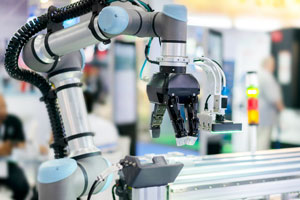
Robotics and computer automation have significant and inevitable implications for the manufacturing side of the retail industry. Advances in artificial intelligence mean fewer and fewer people are needed for assembling products and operating machinery. This is true within the United States and abroad. Areas such as China, where many goods are currently manufactured because of low labor costs, are already heavily investing in robotic manufacturing. Foxconn, the infamous contract manufacturer for Apple, Amazon’s Kindle, and many other electronics, is one example. According to BBC, last May Foxconn laid off 60,000 workers because their jobs are now being completed by robots or automated systems.
Bringing Jobs Back
The House of Representatives’ proposed Border Adjustment Tax aims in part to bring manufacturing jobs back to the United States. The proposed plan would in effect tax products and parts that are imported from other countries for the purpose of resale by 20 percent. The idea is that many businesses would then choose to manufacture their products within the country instead of paying the additional tax. As a result, the American middle class will benefit with more jobs from a renewed manufacturing industry.
An Automated Future
However, what happens when the manufacturing process becomes completely automated? Masayoshi Son, the CEO of SoftBank, not only believes that over the next few decades robots will be smarter than humans and replace many human jobs, but is also dedicating tens of billions of dollars into making this vision become a reality. “Within 40 years, in every aspect of every industry… I’m expecting artificial intelligence will exceed the wisdom of human beings,” he said at an investor’s meeting last June. Just over a month ago, Son echoed his opinion at the Mobile World Congress in Barcelona. He claims the Singularity, or the tipping point when human intelligence is surpassed by artificial intelligence, will be here within many of our lifetimes. “In [the] next 30 years this will become a reality.” He continues, “It will be much more capable than us – what will be our job? What will be our life? We have to ask philosophical questions. Is it good or bad?”
With the automation of manufacturing within our near future, Vanity Fair suggests that a Border Adjustment Tax to protect manufacturing jobs is equivalent to trying to “Hold back a tsunami with a seawall.”
Essential Benefits
What does manufacturing automation mean for the retail industry? Well, for starters it could significantly lower the cost of goods in the short term. There are also great implications for the area of personalized and customized retail. For example, a retailer could eventually own their own manufacturing robot or 3D printer to produce sweaters on demand with customized fit, colors, material, and cut based on customer preferences. The automation of manufacturing could mean mass customization and on-demand production. However, there are also many such individuals as Bill Gates, Elon Musk, and Stephen Hawking who propose a tax to companies who replace human employees with machines. At the end of the day, whatever is best for the customer will we best for the retailer in the long run. Tax or no tax, automated manufacturing is a near reality.
